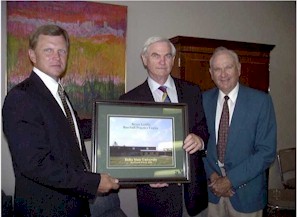|
Cash
Marketable Securities
Mutual Fund Share
Closely Held Business Interests
Real Estate
Personal Property
Life Insurance
1.
Cash
Cash is the most direct
way to make a gift for achieving the goals proposed for
the Foundation. Funds so received for endowment will be
invested according to policies approved by the Wardens and
the Vestry. Gifts of cash are tax deductible to the extent
allowed by law. Print a pledge
form.
2.
Marketable Securities (back to top)
These investments make
excellent gifts for many donors to consider. When a person
owns securities which have a long-term gain and gives them
to the Foundation, the donor may be able to take the full
fair market value of the securities as a charitable deduction
on his or her income tax returns and also avoid all capital
gains taxes.
The quickest and easiest
way to transfer securities to the Foundation is for the
donor to instruct his or her broker to transfer the securities
from the donor’s account to one registered to the Foundation
at the same brokerage house. If the Foundation has no account
with the brokerage house, it is a simple matter to set one
up, and the Foundation officials can facilitate this. If
the donor chooses to deliver stock certificates, they should
be sent unendorsed. To transfer the securities, the donor
should execute a stock power naming Delta State University
Foundation, Inc. as the new owner. If mailed, the
unendorsed certificates and the stock power should be sent
in separate envelopes. Transferring securities between brokerage
houses or through the transfer agent are the least desirable
methods as they may delay the transfer by as much as two
weeks and make it difficult for the donor to control the
date of gift.
3.
Mutual Fund Shares (back to top)
As with marketable
securities, a gift of mutual fund shares, if they have been
held long term and have appreciated, can enjoy the double
advantage of a charitable deduction and capital gains avoidance.
If the shares are kept in street name at a brokerage
house, the transfer procedure is similar to that for marketable
securities. If the shares are held at the mutual fund company,
follow the company’s transfer procedures.
3.
Closely Held Business Interests (back to top)
This includes corporations,
partnerships and other forms of business organization. The
tax deduction is based on the appraised, fair market value.
Common partnership gifts include those involving real estate,
oil and gas properties or equipment leases. Under special
circumstances, a partnership interest may also be used to
fund a charitable lead trust. Another option is a family
limited partnership, which is used to arrange for the orderly
transfer of stock to the next generation and to receive
substantial estate and gift tax savings. The inclusion of
the Foundation as one of the limited partners results in
favorable tax treatment for the donor and the successors
in the partnership.
4.
Real Estate (back to top)
Real estate may be
given outright or with the donor retaining a life estate
contract (See Gifts That Pay Income below.)
The types of property which might be given include residential,
rental, business, or farm real estate. Both fractional and
total interests may be considered. The Foundation may require
a Phase I Environmental Audit. The tax deduction is based
on the appraised, fair market value.
5.
Personal Property (back to top)
Gifts of tangible personal
property related to the mission of the Foundation are welcomed.
At its option, the Foundation may retain such items in its
permanent collections. The donor may take an income tax
deduction for the appraised fair market value of the objects.
6.
Life Insurance (back to top)
There are many types
of life insurance gifts. The most common is an assignment
of an existing policy that is currently in force and paid
up. The donor names the Foundation as owner and beneficiary.
The benefits to the donor are in both gift and estate tax
considerations. In a gift of a policy that is not paid up,
later premium payments are also deductible for tax purposes.
Federal tax regulations indicate that the gift value of
an insurance policy is the value of the policy at the time
of transfer of ownership. Life insurance arrangements might
take one of the following forms:
- Making the Foundation
the Owner and Beneficiary of an Existing Policy
- Purchasing a New
Policy for the Foundation
- Replacing Charitable
Gifts in One’s Estate
|



